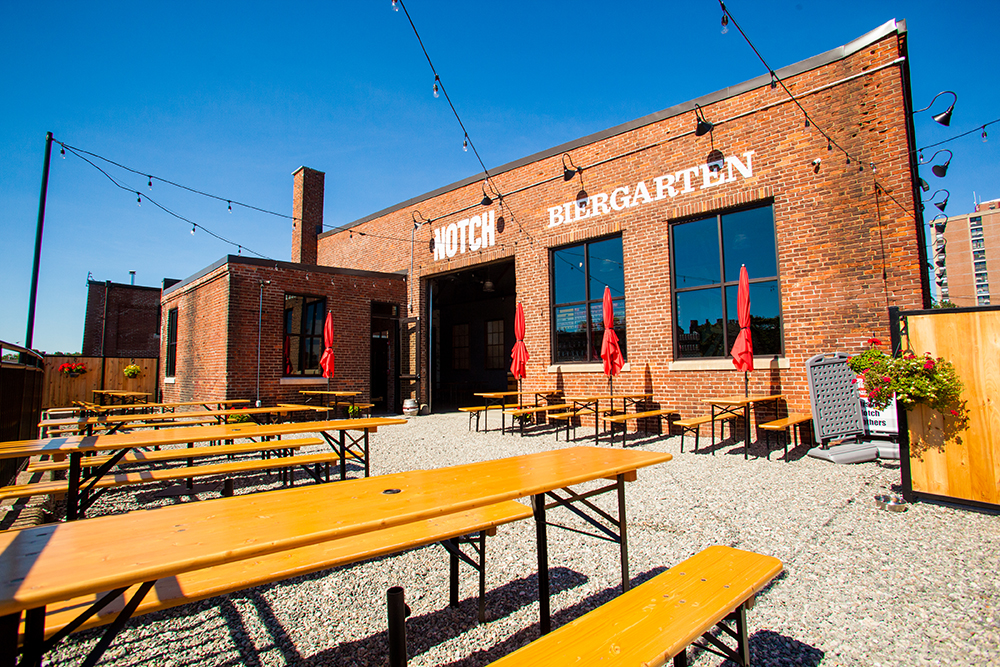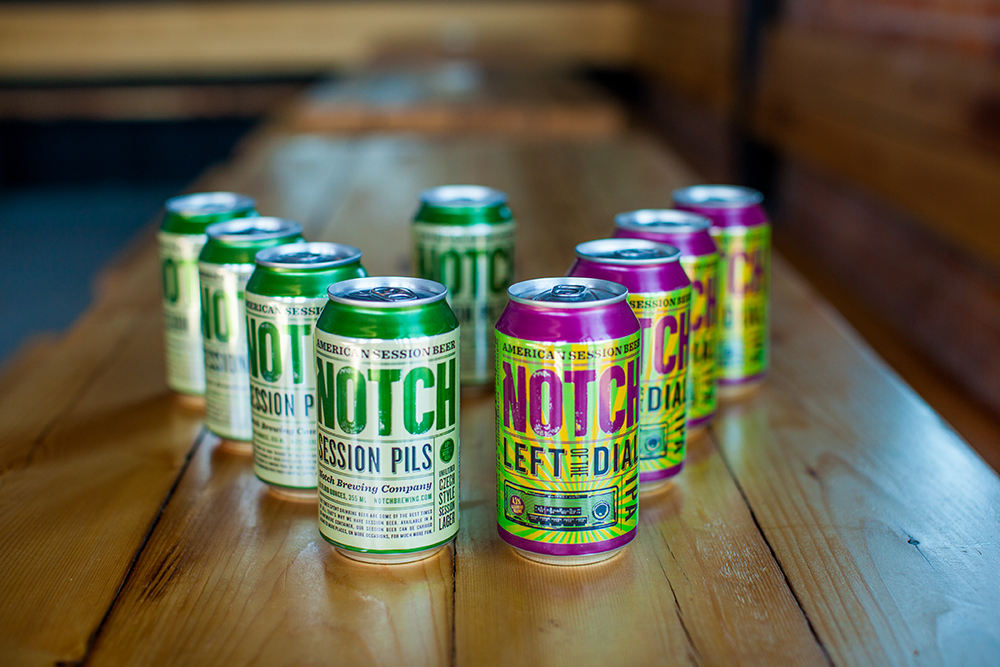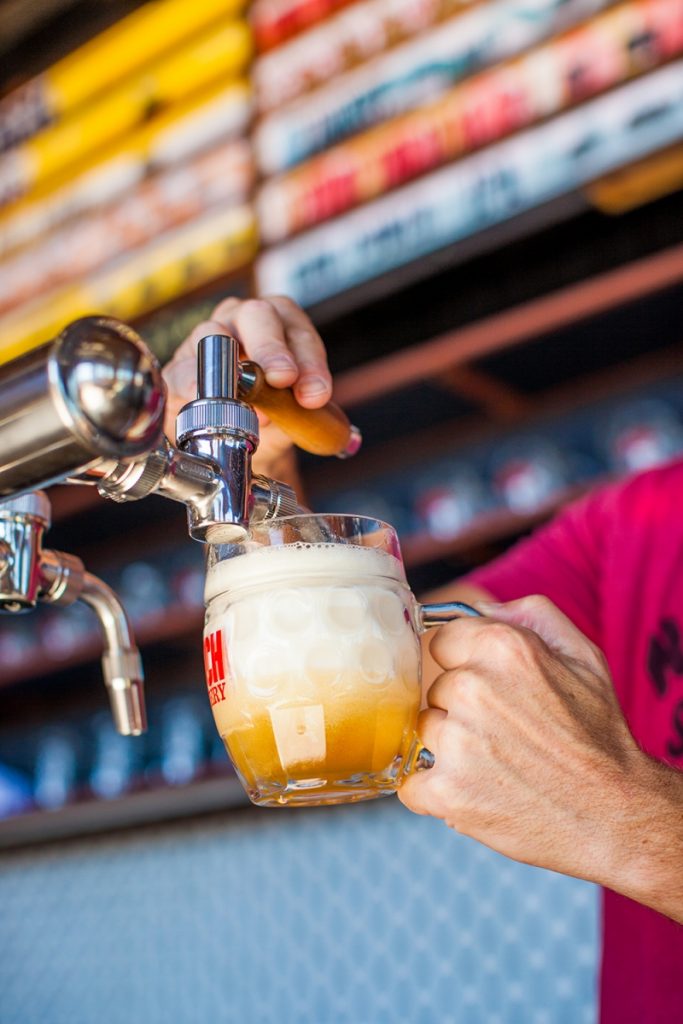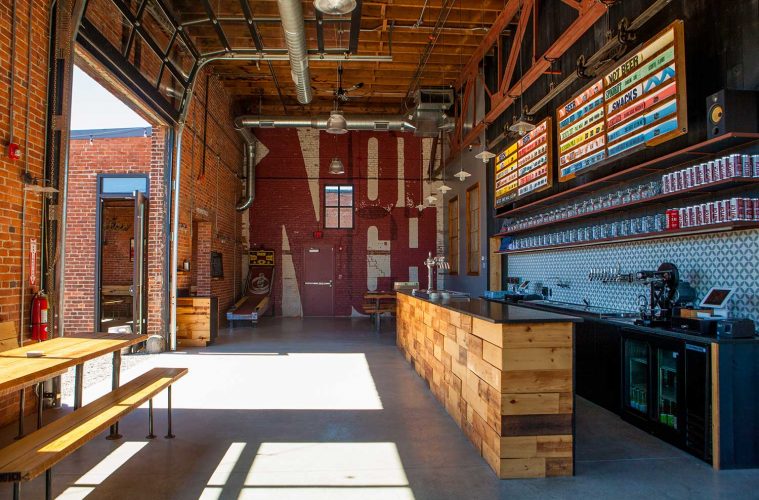Salem’s South River Canal was once home to Pickering Oil Company. The narrow waterway, barely there at low tide, was flanked on both sides by industry. Now, historic buildings, stripped to their bare bones, are slowly beginning to house creative types, nonprofits, and a popular brewery, biergarten, and taproom. Just down from the Derby Street neighborhood that once housed Polish and Russian immigrants, classic German and Czech beers are served on communal tables. Beer drinkers can observe fish jumping and ducks making their landing beneath little twinkly lights.
When Notch opened to much fanfare this summer, it was obvious that time moves more slowly here, in a place where the expectation is to do no more than drink. No pressure to order a meal, because none are on offer. You can sit all day, laze about, bring your dog, and meet the person at the end of the table.
Session beer—a British term for lighter beer under 5 percent percent alcohol—is brewed here, in shiny stills in the back, and satisfies more than one thousand accounts in Massachusetts. According to the Notch website, this beer, long overlooked by the U.S., “is born of workers’ beer. It slaked the thirst of laborers while they plowed the fields, mined for coal, fired the blast furnace, and forged steel.”

What that means to the average person is that you can have a Notch at lunchtime and still go back to work. You can have three at night and wake up the next morning with no regrets. “I don’t like to sip beer,” says owner Chris Lohring. “I want to drink beer. I don’t want to slow down. That’s no fun.”
This former garage is now full of taproom workers, gifted with the right hoppy lingo, who sling brews under 18-foot ceilings. There are no TV screens, just slab floors, historic brick walls, and the reclaimed wood that became the tables and bar. A single Skee-Ball table is a hat tip to the Salem Willows amusement park. Locals flock to pop-ups featuring creations by neighborhood restaurants, and to evenings dedicated to specific interests, like a recent vinyl night in conjunction with Salem’s Record Exchange celebrating a Wilco album release.
If you’re a fan of indie mid-’80s music—and, more specifically, a fan of Minneapolis bands—you just might recognize Notch beers; their Left of the Dial IPA is named after a song by The Replacements, a band beloved by most Minnesotans. A new German pale lager was recently christened “Fodderstompf,” the last song on an album by Public Image Ltd, an English post-punk band.

This winter, layer up and head out to the biergarten, because it will stay open with added games to keep you moving and warm. This space, with its 16 long wooden tables, serves as a riverside oasis, a place to meet other beer enthusiasts and their dogs, and maybe their kids. It’s what you make of it—perhaps a snuggle destination on a crisp evening for watching a waning moon rise over the harbor.
If you prefer the indoors, there’s always the Stammtisch. This is the little private room for the regular customers in a German beer hall. (It’s self-regulated.) Once the boiler room that looked like a scene from a scary movie, complete with bullet holes, it’s now a fun place to hide from the tide of tourists.
Food is simple and chosen with beer drinking in mind: a Bavarian sausage made in Madison, Wisconsin, called Landjager, a German soft pretzel from Swiss Bakers in Allston, and now pickled veggies from Salem’s Maitland Mountain Farm. The place has no intention of behaving like a restaurant or taking away from those establishments who serve Notch on tap.
After decades of brewing, Lohring knows everyone in the industry and enjoyed hearing my short retelling of the early days at Cisco on Nantucket, where his friend Randy Hudson has been head brewer for years, and where I, as the brewery’s first female employee, lifted lead-heavy boxes, sold merch, and poured countless beers for island visitors.
Lohring, who can be spotted regularly at Notch chatting it up with customers in his uniform of a trendy T-shirt, jeans, and sneakers, co-founded the Charlestown-based Tremont in 1993, and acted as head brewer. When it sold to Shipyard in Portland, Maine, he took his time to figure out what to do next. Long annoyed at the way U.S. brewers skewed the subtle drinkable beers of Europe to create more aggressive IPAs, barley wines, and imperial stouts, he sought the day-to-day pilsners and light lagers.

As a session beer warms up and “presents itself,” as those in the biz say, it changes over time. Beer drinkers often want to “get a paddle, tick them off,” says Lohring, referring to the common practice of sampling all that a brewery has on offer. The problem with this is that “you don’t get to know that beer because you’re so anxious to try another,” he says.
Would session beer get any awareness, when big beer was all the rage? Lohring didn’t know. But he started brewing it in 2010 anyway, and about three years ago, session beers began to take off. Notch was already there.
Lohring’s local cred is a good story. He’s a fourth-generation Salemite living in his great-grandparents’ house in the Derby Street neighborhood. His Polish immigrant relatives worked at Parker Brothers on board games like Monopoly and in the Naumkeag building at Shetland Park making cotton sheets.
With the ability to see both sides—the old timers who resist change and the way the South River renaissance has led to a clear connection between Pickering Wharf and downtown Salem—Lohring says Salem is moving forward by harkening to its past, when residents never had to leave the same walkable blocks for anything.
“Because my family has been here a while, I know the old-school mentality,” he says. “I always heard there is so much potential here. The creative things we knew Salem would support are coming. I think what’s happening now is people are able to get everything they need downtown. I don’t think it’s changed. I think it’s going back to what it used to be.”
Notch Brewery & Tap Room
283R Derby St., Salem

